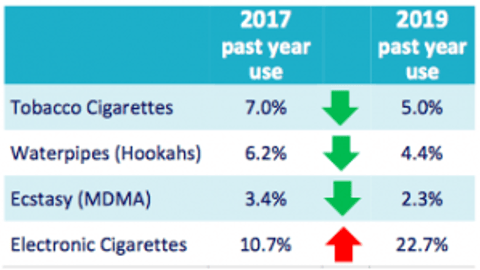Statistics Canada fires up concerns over youth vaping
Young people in Canada are more likely to have never smoked a cigarette, but the prevalence of vaping among youth is still far above that of older folks and rising, and could reintroduce the smoking habit, Statistics Canada says.
Cigarettes have fallen steadily in popularity since the 1960s, when around half of the population had a habit, thanks to high rates of taxation, a ban on advertising, and a dwindling number of public places where it is permitted.
Meanwhile, in 2021, some 12% of youth aged 15 to 19 and 17% of 20- to 24-year-olds said that they had used a vaping device - which heats a liquid that typically includes nicotine into a vapour that is inhaled - in the past month. That compared to just 4% of adults aged 25 or older, the statistics agency said.
More than six out of 10 Canadian youth aged 15 to 19 and more than a quarter of young adults aged 20 to 24 have never tried a cigarette.
Overall in 2021, 10% of Canadians reported smoking cigarettes on a regular basis. For all age groups, cigarette smoking remained stable compared with the previous year.
Young people are more likely to have engaged in vaping if they have a job, drink alcohol, or have friends who engage in negative behaviours, StatCan said, while a diagnosis of attention deficit hyperactivity disorder was a risk factor for 12- to 14-year-olds.
Older adolescents who are male, Canadian-born, have lower grades, or use tobacco or cannabis were also more likely to vape, the agency said.
One-third of teenagers who had vaped recently said they mostly did it to reduce stress, an increase from the one in five who said the same in 2019, which correlates to an increase in youth mental health challenges caused by the COVID-19 pandemic and related disruptions to education and workplaces.
"While vaping may be less harmful than the inhalation of smoke from tobacco, it poses risks of nicotine dependence, other substance use, and respiratory and cardiovascular disease,'' StatCan said.
"It is feared that the widespread adoption of vaping may undermine longer-term reductions in smoking and lead to the re-normalization of tobacco use.''



